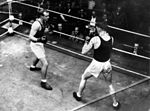Nelson Mandela 70th Birthday Tribute
1988 in British music1988 in LondonAll pages needing cleanupConcerts at Wembley StadiumEngvarB from August 2014 ... and 10 more
June 1988 in the United KingdomMusic festivals established in 1988Music festivals in LondonMusical tributesNelson MandelaPop music festivalsRock festivals in EnglandRock festivals in the United KingdomTribute concerts in the United KingdomWikipedia pages needing cleanup from November 2019

The Nelson Mandela 70th Birthday Tribute was a popular-music concert staged on 11 June 1988 at Wembley Stadium, London, and broadcast to 67 countries and an audience of 600 million. Marking the forthcoming 70th birthday (18 July 1988) of the imprisoned anti-apartheid revolutionary Nelson Mandela, the concert was also referred to as Freedomfest, Free Nelson Mandela Concert and Mandela Day. In the United States, the Fox television network heavily censored the political aspects of the concert. The concert is considered a notable example of anti-apartheid music.
Excerpt from the Wikipedia article Nelson Mandela 70th Birthday Tribute (License: CC BY-SA 3.0, Authors, Images).Nelson Mandela 70th Birthday Tribute
South Way, London
Geographical coordinates (GPS) Address Nearby Places Show on map
Geographical coordinates (GPS)
| Latitude | Longitude |
|---|---|
| N 51.556 ° | E -0.28 ° |
Address
South Way
HA9 0QB London (London Borough of Brent)
England, United Kingdom
Open on Google Maps





